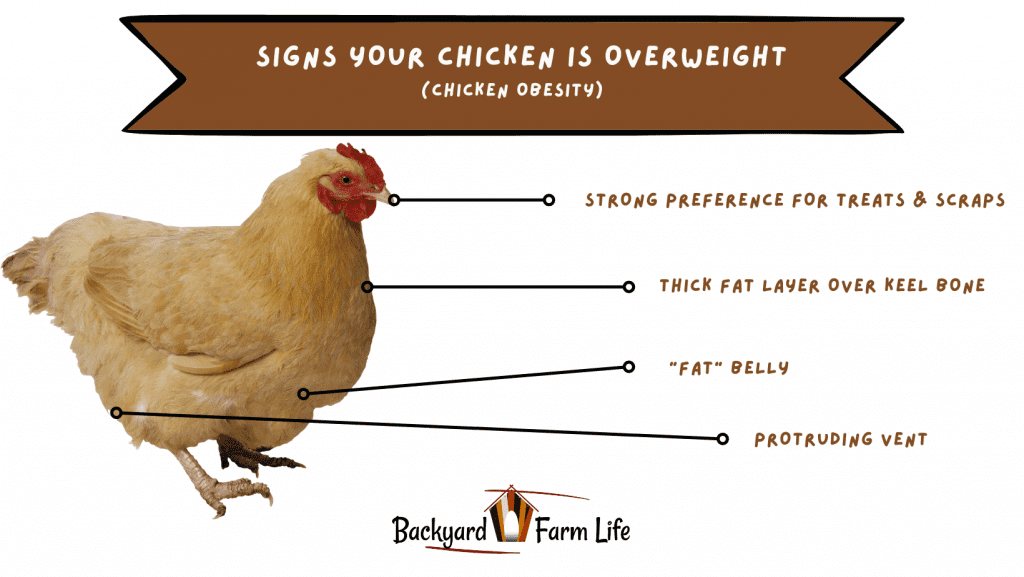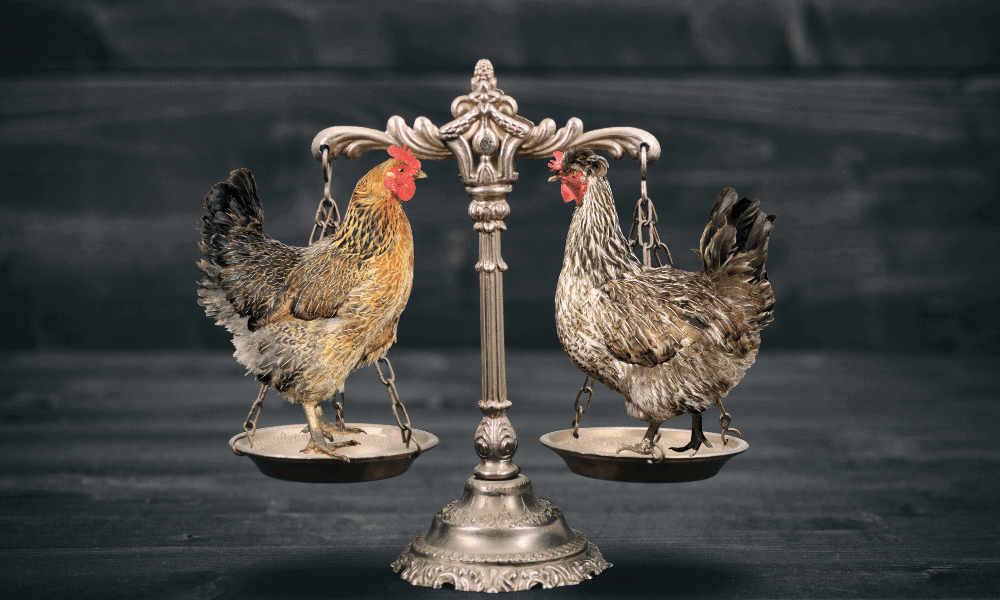I’ve noticed that a few of my larger chickens tend to waddle, while my slimmer chickens are much more agile. They all feed on the same chicken feed and healthy table snacks, but it appears some are just, well, fatter?
As it turns out chicken obesity is a HUGE problem, and it’s just getting BIGGER, as more people are keeping backyard chickens for their eggs and as pets, rather than for their meat.
Here we go through if chickens can actually get fat, the signs your chickens are overweight, and what you can do about it.
Can Chickens Actually Get Fat?
Back in the old days, it was more common to keep chickens for their meat. But in modern times, with the help of zoning rule changes in urban and suburban areas, chickens are more and more being kept for their eggs and as backyard pets.
Just like any other animal, if chickens consume more calories than they can use, they will naturally put on weight. So, chickens can actually get fat. Given chickens are mostly active creatures, the leading cause of overweight chickens comes from their regular diet.
Of course, the old-school diets of a meat chicken and modern backyard chicken are completely different. When it comes to raising chickens for meat, like in a commercial setting, they will be fed optimal growth & high protein foods designed to make the chickens bigger. These chickens also don’t tend to live long enough to feel the true effects of their diet.
But, times have changed. Now, we can’t simply follow the same diet regime as these chickens, as we want our backyard chickens to live a long, healthy, and happy life.
Chicken Obesity
Chickens don’t gain excess weight in the same way as other animals or humans. If your chickens are consuming more calories than they need, the excess is stored as fat in the belly and liver. This can very easily cause health issues for your chooks, most commonly fatty liver hemorrhagic syndrome, which occurs often in overweight hens and can be fatal.
So, the effects of chicken obesity are all too real. Aside from directly causing health issues, chicken obesity can also cause bumblefoot from increased inactivity, overheating or heat stroke, and reduced egg production in hens.
The best way to combat chicken obesity is to carefully monitor their diet, reduce feeding them treats or table scraps, and encourage activity in your chickens.
How Do You Know if Your Chicken Is Overweight?

Most chickens have fluffy feathers that somewhat hide their true bodies, so it can be difficult to tell the actual weight of your chicken visually. Plus, between so many different breeds of chickens, it’s hard to keep track of what a ‘normal weight’ should even be!
So how do you know if your chicken is overweight?
One of the first observable ways to tell if your chicken is overweight is by looking at the belly of your chicken and the area below the vent. This tends to be where the excess fatty tissue forms, around the liver, so if your chicken has a disproportionate belly it may be a sign they are overweight.
You can also feel down the keel bone, which separates the two breasts of your chickens. If you’re struggling to find the bone, and the chicken’s breasts are protruding past it, then it could be a sign of obesity too.
Another good way to tell if your chicken is overweight is by monitoring their weight, and weighing them each month to track changes. Although chickens do differ in size naturally, hens of the same age and breed should tend to be very close in weight. By weighing your chickens you can catch on early if they start putting on weight.
An indirect way that hints at an overweight chicken is by observing how much time they spend inactive. But, don’t confuse a broody hen with an inactive one, as it’s normal for a laying hen to go through cycles of becoming broody. A sign of inactivity is observed by much less foraging in the yard and more getting their food straight from the feeder.
Signs Your Chicken Is Overweight
Aside from directly observing your chicken’s size, an overweight chicken will also display various behavioral changes that can be used as early warning signs to tell if your chicken is overweight. These other indicators of obesity in chickens include:
- Difficulty laying eggs, or reduction in egg production.
- Difficulty moving, particularly running.
- Much pickier with their diet, tends to prefer to fill up on table scraps.
- Frequent prolapse.
- Bumblefoot.
What to Do if Your Chicken Is Too Overweight?

If you suspect your chicken is overweight, or have observed some of the signs, then there are a few easy ways to begin the reversal process, lowering any risk of health effects of chicken obesity. Here are some tips:
Limit The Treats & Scraps
It seems simple, but when you’re all for zero-waste and want to make use of your safe table scraps for your chickens then it can be a hard habit to kick.
You may have the right intention of feeding your chickens fruits and vegetables, but too much of any food group will cause an imbalance in your chicken’s normal dietary requirements.
If you’re wanting to cut down your chicken’s consumption of treats and scraps, keep a strict regime of regular layer pellets or a seed mix, and encourage your chickens to forage to find the remaining 10% of their diet!
The opposite can be said if your chickens are underweight — you can supplement their regular feed with high-energy foods to help them gain weight!
Cooling Your Chicken’s Body Temperature
One real and true effect of chickens being overweight is the tendency for them to overheat. This can be both bad for their health, but it will also encourage them to become inactive, as they are too hot to exercise.
Since chickens don’t have sweat glands, they cool their bodies down relying on respiration. If your chickens are overweight they will likely also have more difficulty breathing, so everything seems to be working against them here.
If you can provide a cool environment to cool down your chicken’s body temperature, like a well-ventilated coop or access to cold water, they will more likely become more active and start working against the problem rather than working with it!
More Exercise
When your chickens start to become overweight, they fall into a vicious cycle that encourages them to simply get fatter and fatter. This is because as chickens become overweight, they also become more inactive, causing further differences in calories consumed vs. energy spent.
To encourage your chickens to become more active, regardless of their size, you can reinforce their behavior with food by:
- Hanging a suet cage filled with healthy greens and root vegetables, like radishes or beets, just above their head height so they have to jump a little bit to peck at it.
- With your chickens’ attention, scatter healthy seeds (like flax seeds) and grains throughout your yard to encourage more foraging behavior. Chickens get most of their exercise from foraging throughout your backyard.
- As much as possible let your chicken’s free range around your yard, this simply means they will be more likely to wander around rather than sit down.
- Make sure your chickens have enough space in their coop to move around, limited space causes stress which can cause inactivity.
Time To Get Moving
More and more people are catching on to the wonders of having backyard chickens. With the endless entertainment, genuine companionship, and delicious fresh eggs I say “About time!”.
But, with the growth of backyard chicken keepers, we need to be sure everyone is getting the correct, vital information required to keep your backyard chickens safe, healthy, and happy.
Chicken obesity is a constant problem we all need to watch out for. If you notice any of the early warning signs, take action and change their diet and encourage more activity in their daily rhythm. Slowly but surely your chickens will return to a healthy weight, reducing any risk of developing health concerns.
